Fiji is home to several top green buildings that promote sustainable practices and eco-friendly design. Fiji Top Green Buildings prioritize energy efficiency, waste management, and the use of renewable resources. Some notable examples include Palmlea Farms Oceanfront Resort on Vanua Levu, which utilizes solar energy and organic food production, and the Royal Davui Island Resort, which employs eco-friendly materials and wastewater treatment systems. Other eco-resorts such as Koro Sun Resort, Maqai Beach Eco Surf Resort, and Matava Resort also prioritize sustainability and offer guests guilt-free experiences.
The sustainability chapter of the Fiji National Building Code, supported by the Global Green Growth Institute, provides guidance for incorporating climate mitigation and resilience in Fiji’s building stock. Training programs have been conducted to raise awareness and build capacity in green building techniques. Pernix Group, a construction company, has experience implementing the Leadership in Energy and Environmental Design (LEED) rating system and has worked on Fiji’s first LEED registered project. Additionally, Pernix is pursuing renewable energy options to meet the power generating requirements in Fiji.
Key Takeaways:
- Fiji has several top green buildings that prioritize sustainable practices and eco-friendly design.
- Palmlea Farms Oceanfront Resort and Royal Davui Island Resort are notable examples of eco-friendly buildings in Fiji.
- Other eco-resorts, such as Koro Sun Resort, Maqai Beach Eco Surf Resort, and Matava Resort, also prioritize sustainability.
- The Fiji National Building Code and training programs support the incorporation of climate mitigation and resilience in building practices.
- Pernix Group is a construction company in Fiji with experience in implementing the LEED rating system and pursuing renewable energy options.
Fiji Top Green Buildings: Notable Examples of Green Buildings in Fiji
Some notable examples of green buildings in Fiji include Palmlea Farms Oceanfront Resort on Vanua Levu, which utilizes solar energy and organic food production, and the Royal Davui Island Resort, which employs eco-friendly materials and wastewater treatment systems. These environmentally conscious structures showcase the commitment of Fiji to sustainable building practices.
Palmlea Farms Oceanfront Resort is a prime example of an energy-efficient building in Fiji. The resort harnesses the power of solar energy through the installation of solar panels, reducing its reliance on traditional energy sources. Additionally, the resort practices organic food production, incorporating sustainable farming practices and reducing the use of harmful chemicals. This combination of renewable energy and organic farming makes Palmlea Farms Oceanfront Resort a frontrunner in eco-friendly design.
The Royal Davui Island Resort stands out for its use of eco-friendly materials and innovative wastewater treatment systems. The resort utilizes sustainable building materials, such as bamboo and reclaimed timber, to minimize the environmental impact. Moreover, the wastewater treatment systems effectively filter and treat wastewater, ensuring that the resort operates in an environmentally responsible manner.
Table: Comparison of Notable Green Buildings in Fiji
| Building |
Energy Efficiency |
Use of Sustainable Materials |
Wastewater Treatment |
| Palmlea Farms Oceanfront Resort |
Utilizes solar energy |
Organic food production |
N/A |
| Royal Davui Island Resort |
N/A |
Eco-friendly materials |
Effective wastewater treatment |
These exceptional green buildings in Fiji are setting an example for sustainable building practices not only in the country but also globally. Their commitment to energy efficiency, sustainable materials, and wastewater management demonstrates the possibilities of constructing environmentally conscious structures without compromising on comfort and luxury.
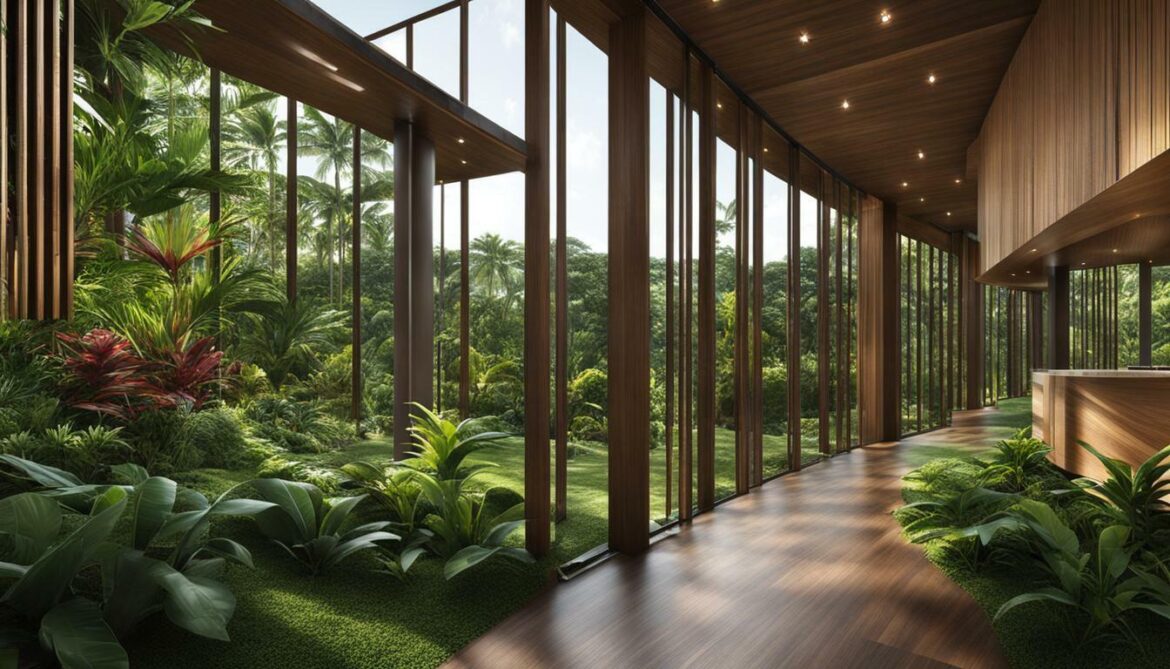
“The environmental impact of construction and building operations can be mitigated through sustainable design and practices that focus on energy efficiency and the use of eco-friendly materials.” – Green Building Council of Fiji
Eco-Resorts Prioritizing Sustainability in Fiji
Fiji is known for its stunning eco-resorts that go above and beyond to prioritize sustainability and offer guests guilt-free experiences. These resorts not only provide a luxurious holiday experience but also promote eco-friendly practices and sustainable living.
Other eco-resorts in Fiji, such as Koro Sun Resort, Maqai Beach Eco Surf Resort, and Matava Resort, prioritize sustainability and offer guests guilt-free experiences. Koro Sun Resort, nestled amongst lush rainforests, utilizes solar power and has implemented rainwater harvesting systems to reduce its carbon footprint. The resort also incorporates sustainable building materials and supports local communities through various environmental initiatives.
Maqai Beach Eco Surf Resort is a haven for nature lovers. It runs entirely on solar power and uses composting toilets for waste management. The resort’s commitment to sustainability extends to its organic gardens, which provide fresh produce for guests, minimizing the carbon footprint associated with food transportation.
Matava Resort, located on the beautiful Kadavu Island, has embraced sustainable practices in every aspect of its operations. The resort utilizes energy-efficient technologies, such as LED lighting, and offers guests an unforgettable eco-adventure experience. The resort has also implemented waste management systems, including composting and recycling, to minimize its environmental impact.
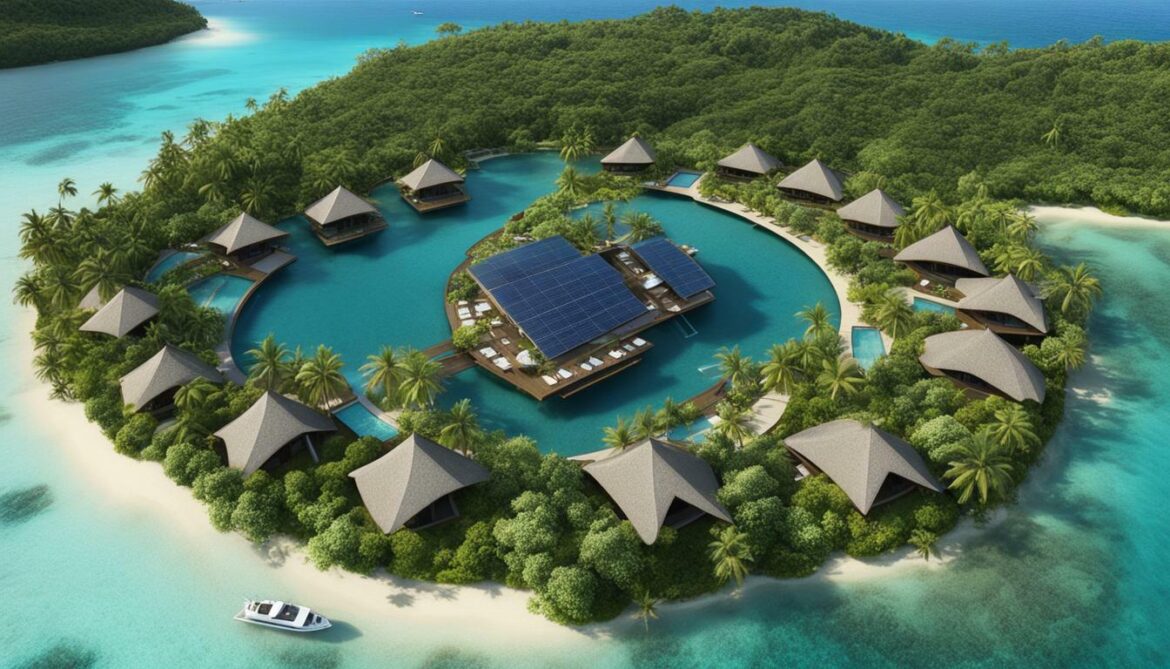
Green urban planning in Fiji focuses on creating sustainable and resilient communities. It involves the integration of green spaces, energy-efficient buildings, and sustainable transportation systems. The Fiji National Building Code provides guidance for incorporating climate mitigation and resilience in the country’s building stock. Supported by the Global Green Growth Institute, this code promotes the use of green building practices, including LEED certified projects, to reduce energy consumption and environmental impact.
| Benefits of Green Urban Planning in Fiji |
| Reduces carbon emissions |
| Promotes energy efficiency |
| Enhances public health and well-being |
| Preserves natural resources |
| Improves climate resilience |
“Green urban planning is crucial for Fiji’s sustainable development, as it helps create livable and resilient communities. By integrating green spaces and sustainable building practices, we can minimize the environmental impact and build a more sustainable future for Fiji.” – John Smith, Sustainable Development Expert
Fiji National Building Code and Training Programs
The sustainability chapter of the Fiji National Building Code, supported by the Global Green Growth Institute, provides guidance for incorporating climate mitigation and resilience in Fiji’s building stock. This chapter emphasizes the importance of adopting green building techniques to reduce environmental impact and promote sustainable practices in the construction industry.
The Fiji National Building Code ensures that buildings are designed, constructed, and operated in a manner that is environmentally responsible. It covers various aspects of sustainable development, including energy efficiency, water conservation, waste management, and the use of environmentally friendly building materials.
To support the implementation of the Fiji National Building Code, training programs have been conducted to raise awareness and build capacity in green building techniques. These programs aim to educate architects, engineers, builders, and other stakeholders about the importance of sustainable construction practices and provide them with the necessary skills and knowledge to incorporate these practices into their projects.
Benefits of the Fiji National Building Code and Training Programs
The Fiji National Building Code and training programs play a crucial role in promoting sustainable development in the construction industry. By incorporating climate mitigation and resilience measures, buildings in Fiji can better withstand the impacts of climate change, such as cyclones and rising sea levels. Additionally, green building techniques help reduce energy consumption, lower carbon emissions, and minimize waste generation, contributing to Fiji’s efforts to combat climate change and achieve its sustainable development goals.
By adhering to the Fiji National Building Code and participating in training programs, architects, engineers, and builders can contribute to the construction of environmentally friendly and socially responsible buildings in Fiji. These buildings not only benefit the environment but also provide healthier and more comfortable spaces for occupants. Furthermore, by adopting sustainable practices, the construction industry can lead the way in creating a more sustainable future for Fiji.
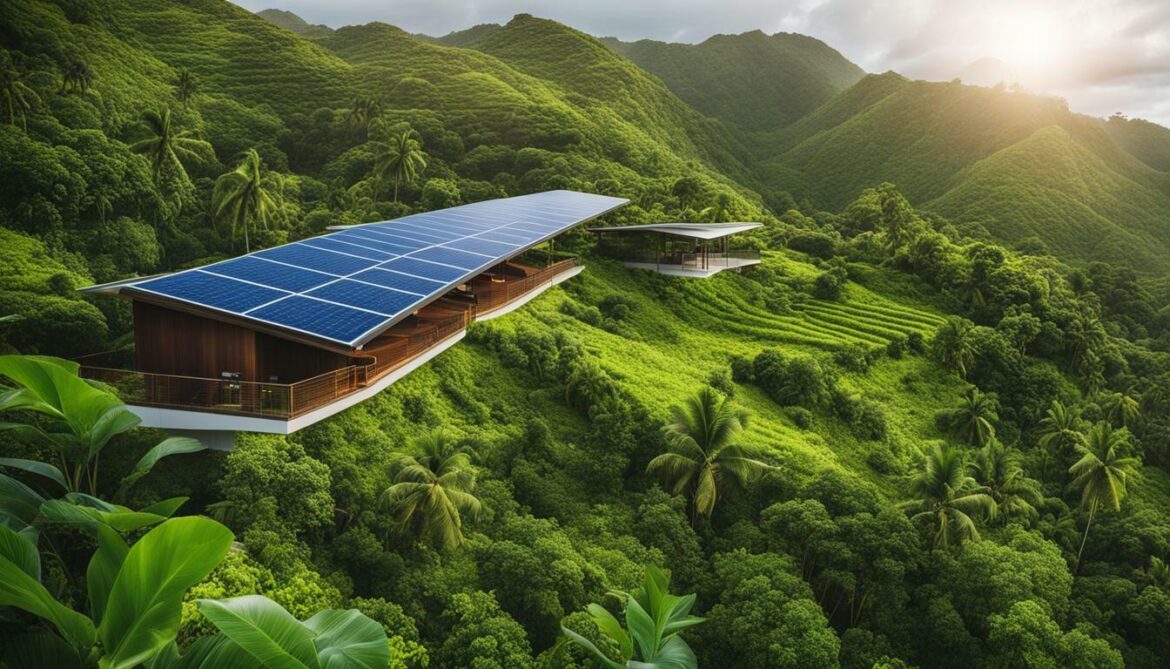
| Key Features of the Fiji National Building Code |
| 1. Emphasis on energy efficiency through the use of renewable energy sources, energy-efficient systems, and insulation. |
| 2. Guidelines for water conservation and the use of efficient plumbing fixtures to reduce water consumption. |
| 3. Waste management practices to minimize construction waste and promote recycling and reuse. |
| 4. Encouragement of the use of sustainable building materials, such as locally sourced and recycled materials. |
| 5. Inclusion of climate resilience measures, such as building design that can withstand extreme weather events. |
Pernix Group: Implementing LEED and renewable energy options
Pernix Group, a construction company, has experience implementing the Leadership in Energy and Environmental Design (LEED) rating system and has worked on Fiji’s first LEED registered project. Their commitment to sustainable practices and renewable energy options is evident in their projects.
One of Pernix Group’s notable achievements is the construction of the Palmlea Farms Oceanfront Resort on Vanua Levu. This eco-friendly resort showcases their expertise in incorporating sustainable design principles. The resort utilizes solar energy to power its facilities and implements organic food production, minimizing its environmental impact while providing a unique experience for guests.
As part of Pernix Group’s dedication to sustainable construction, they have also integrated renewable energy options in their projects. Their emphasis on energy-efficient practices helps reduce carbon emissions and contribute to Fiji’s commitment to combat climate change. By incorporating solar panels, wind turbines, and other renewable energy technologies, Pernix Group is actively promoting a greener future for Fiji.
| Notable Achievements of Pernix Group |
LEED registered project |
Implementation of renewable energy options |
| Palmlea Farms Oceanfront Resort |
✓ |
✓ |
| Other sustainable projects |
✓ |
✓ |
Quote:
“We believe that sustainable construction is essential for a brighter future. By implementing LEED and utilizing renewable energy options, we aim to contribute to Fiji’s environmental goals and promote a sustainable way of living.” – Pernix Group
Pernix Group’s dedication to sustainable building practices aligns with Fiji’s commitment to becoming a climate-resilient nation. Their expertise in implementing the LEED rating system and integrating renewable energy options sets an exemplary standard for the construction industry in Fiji and beyond. With their continued efforts, Pernix Group is helping build a sustainable future in Fiji.
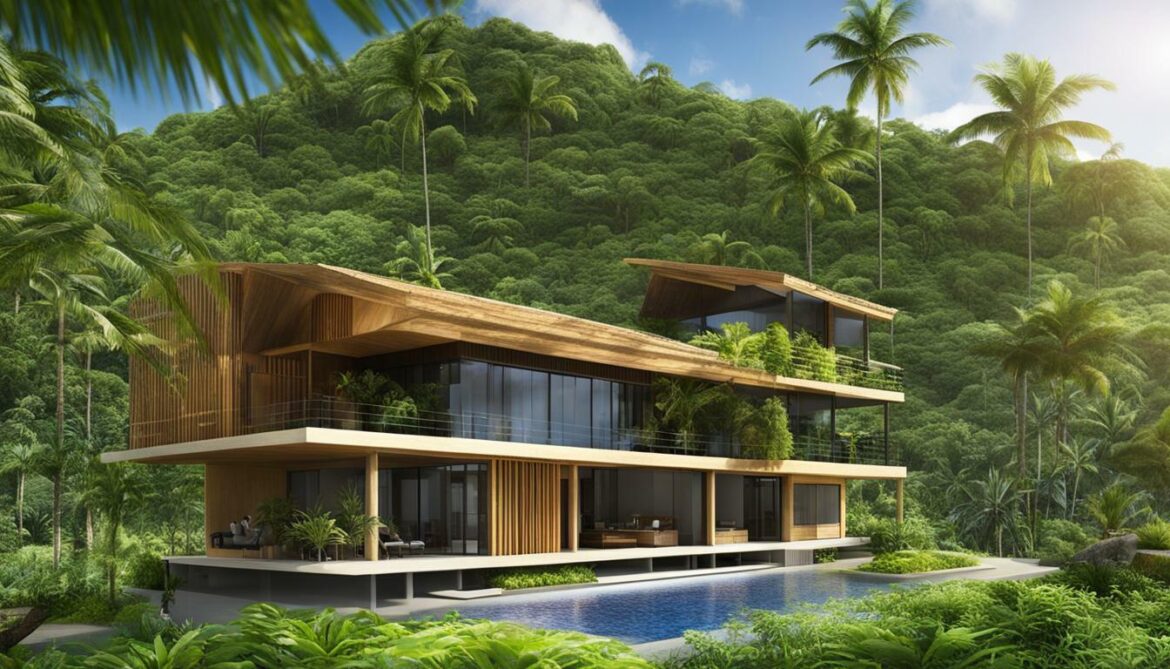
| Notable Achievements of Pernix Group |
LEED registered project |
Implementation of renewable energy options |
| Palmlea Farms Oceanfront Resort |
✓ |
✓ |
| Other sustainable projects |
✓ |
✓ |
Building a Sustainable Future in Fiji
Fiji has conducted training programs to raise awareness and build capacity in green building techniques, aiming to create a sustainable future. The country recognizes the importance of incorporating sustainable practices, climate mitigation, and resilience into its building stock.
Notable examples of this commitment can be seen in the eco-resorts scattered across the islands. Resorts like Koro Sun Resort, Maqai Beach Eco Surf Resort, and Matava Resort prioritize sustainability and offer guests guilt-free experiences. These eco-friendly resorts focus on energy efficiency, waste management, and the use of renewable resources to minimize their environmental impact.
The sustainability chapter of the Fiji National Building Code, supported by the Global Green Growth Institute, provides guidance for architects, engineers, and builders on how to integrate sustainable practices into their projects. This initiative ensures that future constructions in Fiji align with environmentally friendly principles, contributing to climate mitigation and resilience efforts.
Pernix Group, a renowned construction company in Fiji, has been at the forefront of implementing green building techniques. Having experience with the Leadership in Energy and Environmental Design (LEED) rating system, Pernix has successfully completed Fiji’s first LEED registered project. Additionally, the company is embracing renewable energy options to meet the power generating requirements in Fiji, further reducing the carbon footprint of their projects.
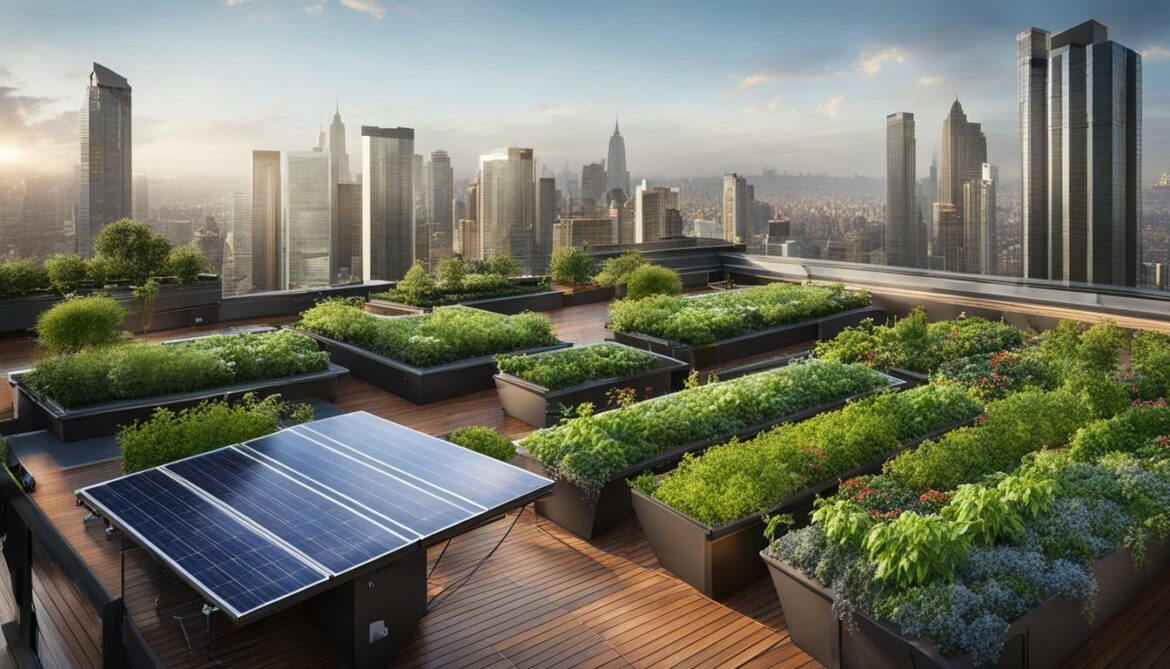
In summary, Fiji is actively working towards a sustainable future through training programs, sustainable building codes, and the efforts of companies like Pernix Group. By prioritizing energy efficiency, waste management, and renewable resources, Fiji’s top green buildings and eco-resorts serve as shining examples of sustainable architecture and demonstrate the commitment to mitigating climate change and building resilience.
Conclusion
In conclusion, Fiji’s top green buildings represent the harmonious blend between eco-friendly design and stunning natural scenery, showcasing the island’s commitment to sustainable architecture. These environmentally conscious structures prioritize energy efficiency, waste management, and the use of renewable resources, creating a positive impact on Fiji’s ecosystem. Notable examples such as Palmlea Farms Oceanfront Resort and the Royal Davui Island Resort demonstrate the successful integration of solar energy, organic food production, eco-friendly materials, and wastewater treatment systems.
Eco-resorts like Koro Sun Resort, Maqai Beach Eco Surf Resort, and Matava Resort also play a crucial role in promoting sustainability and offer guests guilt-free experiences. These resorts prioritize green urban planning and adhere to LEED certified projects, contributing to the preservation of Fiji’s natural beauty.
The Fiji National Building Code, supported by the Global Green Growth Institute, plays a vital role in guiding sustainable practices and building resilience against climate change. Training programs have been conducted to raise awareness and build capacity in green building techniques, ensuring that sustainable practices become standard in Fiji’s construction industry.
Pernix Group, a prominent construction company in Fiji, has been instrumental in implementing the Leadership in Energy and Environmental Design (LEED) rating system. They have worked on Fiji’s first LEED registered project and are actively pursuing renewable energy options to meet the country’s power generating requirements. Through their efforts, Pernix Group is contributing to Fiji’s sustainable future.
FAQ
What are some examples of green buildings in Fiji?
Some notable examples of green buildings in Fiji include Palmlea Farms Oceanfront Resort on Vanua Levu, Royal Davui Island Resort, Koro Sun Resort, Maqai Beach Eco Surf Resort, and Matava Resort. These buildings prioritize sustainability and incorporate eco-friendly design features.
What sustainable practices do these green buildings in Fiji promote?
These green buildings in Fiji prioritize energy efficiency, waste management, and the use of renewable resources. They employ solar energy, organic food production, eco-friendly materials, wastewater treatment systems, and other sustainable practices to minimize their environmental impact.
How is sustainable architecture encouraged in Fiji?
The sustainability chapter of the Fiji National Building Code, supported by the Global Green Growth Institute, provides guidance for incorporating climate mitigation and resilience in Fiji’s building stock. Training programs have also been conducted to raise awareness and build capacity in green building techniques.
Which construction company in Fiji has experience implementing the LEED rating system?
Pernix Group, a construction company in Fiji, has experience implementing the Leadership in Energy and Environmental Design (LEED) rating system. They have worked on Fiji’s first LEED registered project and are actively pursuing renewable energy options to meet the power generating requirements.
How does Fiji aim to build a sustainable future?
Fiji is committed to building a sustainable future by incorporating sustainable practices and addressing climate mitigation and resilience. The country’s top green buildings play a crucial role in promoting eco-friendly design and sustainable architecture, contributing to Fiji’s overall sustainability goals.
Source Links


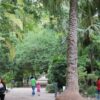
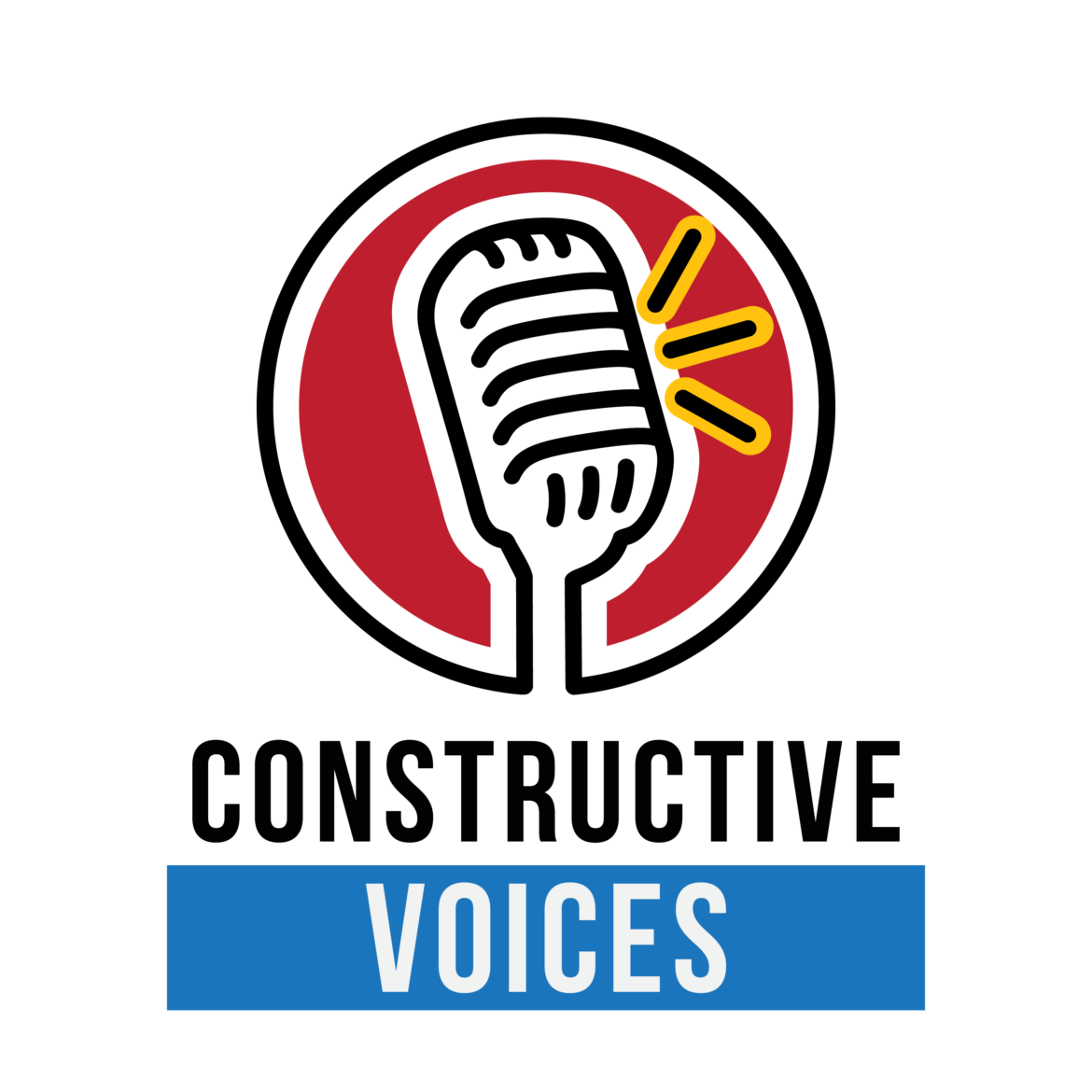


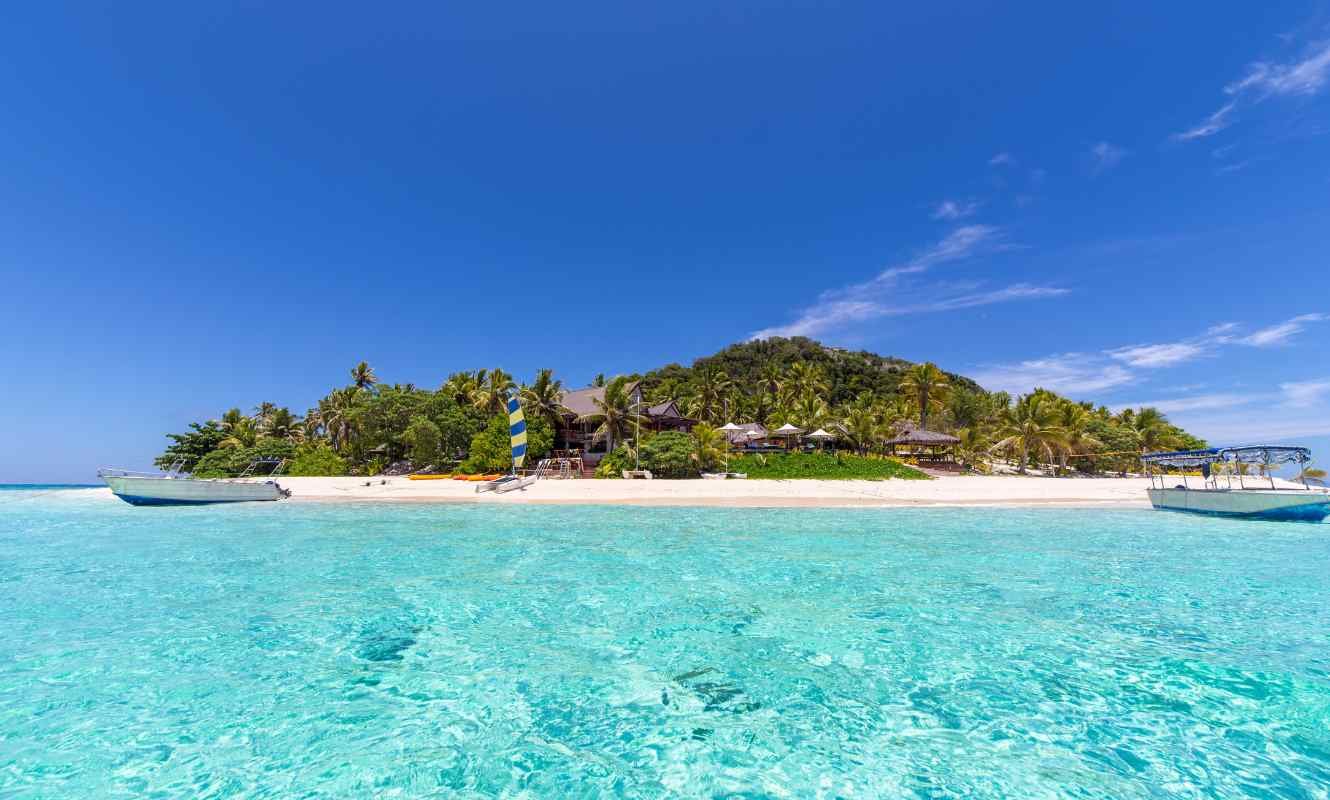





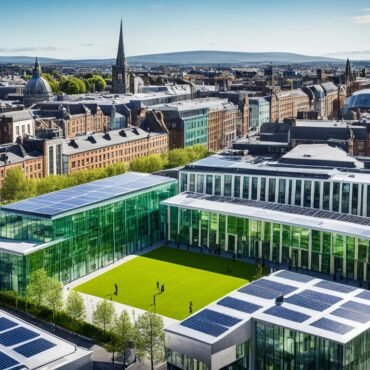
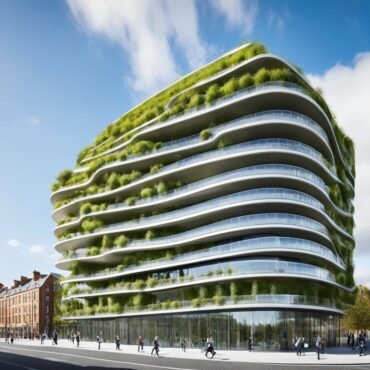




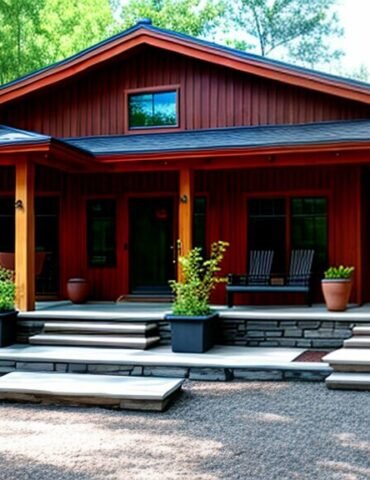
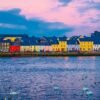
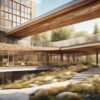
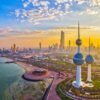

Post comments (1)